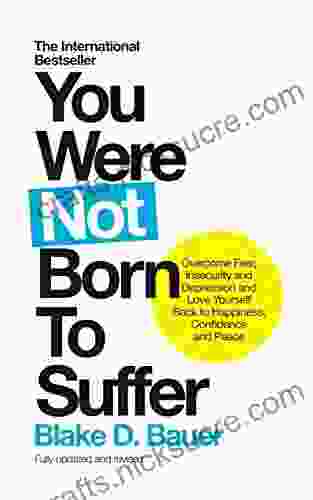Researching Discourse: A Student's Guide

5 out of 5
| Language | : | English |
| File size | : | 6926 KB |
| Text-to-Speech | : | Enabled |
| Screen Reader | : | Supported |
| Enhanced typesetting | : | Enabled |
| Print length | : | 240 pages |
Discourse analysis is a captivating field that interrogates the relationship between language, context, and social interaction. For students pursuing studies in this area, conducting thorough and meaningful research is essential. This guide is designed to equip you with a comprehensive overview of research methods and techniques specifically tailored to discourse analysis. By delving into the intricacies of data collection, analysis, and interpretation, this guide will empower you to navigate the research process with confidence and rigor.
Research Methods in Discourse Analysis
Qualitative Research
Qualitative research methods delve deeply into the nuances of human experience and social phenomena. They are particularly suited for discourse analysis as they allow researchers to explore the subtleties of language use, cultural contexts, and social interactions. Common qualitative methods include:
- Conversation analysis: Examines the structure and organization of everyday conversations.
- Discourse analysis: Analyzes spoken or written language to uncover patterns, meanings, and power dynamics.
- Ethnography: Immerses researchers in a particular cultural setting to observe and interpret communicative practices.
- Narrative analysis: Explores the ways in which individuals construct and share their personal experiences.
- Semiotics: Studies signs, symbols, and other forms of representation.
Quantitative Research
Quantitative research methods employ statistical techniques to examine large datasets and uncover patterns or relationships. While less common in discourse analysis, they can sometimes be useful for analyzing large text corpora or measuring specific linguistic features. Common quantitative methods include:
- Content analysis: Examines the frequency and distribution of specific words or phrases in a text.
- Corpus linguistics: Analyzes large collections of texts using computer-assisted tools.
- Statistical analysis: Uses statistical techniques to test hypotheses or identify relationships.
Data Collection in Discourse Analysis
Selecting appropriate data collection methods is crucial for ensuring the validity and reliability of your research. Common data collection methods in discourse analysis include:
- Observation: Observing and recording naturally occurring conversations or interactions.
- Interviews: Conducting structured or semi-structured interviews with research participants.
- Document analysis: Analyzing written texts, such as transcripts, emails, or newspaper articles.
- Participant observation: Immersed in a community or setting while collecting data and developing relationships.
- Conversation recording: Audio or video recording conversations for later analysis.
Data Analysis in Discourse Analysis
Once data has been collected, it must be carefully analyzed to extract meaningful insights. Common data analysis techniques in discourse analysis include:
- Thematic analysis: Identifying and interpreting recurring themes or patterns in the data.
- Discourse analysis: Analyzing the ways in which language is used to construct social reality.
- Conversation analysis: Examining the structure and organization of conversations.
- Discourse positioning: Analyzing the ways in which individuals position themselves and others in discourse.
- Critical discourse analysis: Examining the ways in which discourse reproduces and reinforces social inequalities.
Theoretical Frameworks in Discourse Analysis
Theoretical frameworks provide a conceptual lens through which to interpret and analyze discourse. Common theoretical frameworks in discourse analysis include:
- Social constructionism: Views reality as socially constructed and negotiated through discourse.
- Critical realism: Assumes that there is an objective reality that can be indirectly known through discourse.
- Post-structuralism: Emphasizes the fluidity and instability of meaning.
- Feminist theory: Explores the ways in which gender shapes discourse and social interactions.
- Discourse theory: Focuses on the ways in which discourse constitutes and shapes social practices.
Conducting research in discourse analysis requires a combination of theoretical understanding, methodological rigor, and analytical insight. This guide has provided a comprehensive overview of the key research methods, data collection techniques, data analysis strategies, and theoretical frameworks used in the field. By following the steps outlined in this guide, you will be well-equipped to embark on your own research journey and generate meaningful and impactful insights into the complex world of discourse.
Delve into the captivating field of discourse analysis with confidence. By embracing the research methods and techniques outlined in this guide, you will uncover the hidden layers of language, communication, and social interaction. Your research will not only contribute to the advancement of knowledge but also empower you to critically engage with the world around you.
5 out of 5
| Language | : | English |
| File size | : | 6926 KB |
| Text-to-Speech | : | Enabled |
| Screen Reader | : | Supported |
| Enhanced typesetting | : | Enabled |
| Print length | : | 240 pages |
Do you want to contribute by writing guest posts on this blog?
Please contact us and send us a resume of previous articles that you have written.
 Fiction
Fiction Non Fiction
Non Fiction Romance
Romance Mystery
Mystery Thriller
Thriller SciFi
SciFi Fantasy
Fantasy Horror
Horror Biography
Biography Selfhelp
Selfhelp Business
Business History
History Classics
Classics Poetry
Poetry Childrens
Childrens Young Adult
Young Adult Educational
Educational Cooking
Cooking Travel
Travel Lifestyle
Lifestyle Spirituality
Spirituality Health
Health Fitness
Fitness Technology
Technology Science
Science Arts
Arts Crafts
Crafts DIY
DIY Gardening
Gardening Petcare
Petcare Gavin D J Harper
Gavin D J Harper Og Mandino
Og Mandino Taylan Hoca
Taylan Hoca Betsy Miller
Betsy Miller Kirk Bailey
Kirk Bailey Dan Shideler
Dan Shideler Paula Deen
Paula Deen Emily Suzanne Clark
Emily Suzanne Clark Aaron Lee Johnson
Aaron Lee Johnson Rob Gray
Rob Gray Alicia C Simpson
Alicia C Simpson Adam Chandler
Adam Chandler Ken Retallic
Ken Retallic Craig Timberg
Craig Timberg Amber Domoradzki
Amber Domoradzki Sorin Dumitrascu
Sorin Dumitrascu Scott Carney
Scott Carney David Winner
David Winner John Hancock
John Hancock Bobby Reyes
Bobby Reyes Ada Calhoun
Ada Calhoun Adam Lazarus
Adam Lazarus Emily K Neuburger
Emily K Neuburger Phil Gaimon
Phil Gaimon Chiara Giuliani
Chiara Giuliani Shuai Huang
Shuai Huang Sam Jarman
Sam Jarman M J Parisian
M J Parisian Achim K Krull
Achim K Krull Leigh Bardugo
Leigh Bardugo Abhishek V R
Abhishek V R T L Lowery
T L Lowery Richard Langer
Richard Langer Ron Hotchkiss
Ron Hotchkiss Jennifer Greene
Jennifer Greene Sarah Maslin Nir
Sarah Maslin Nir Abigail Hair
Abigail Hair Helen Scales
Helen Scales Horace Kephart
Horace Kephart Richelle Mead
Richelle Mead Stacy Eaton
Stacy Eaton Edward J Larson
Edward J Larson Harley Rustad
Harley Rustad Andrew Campanella
Andrew Campanella Lucio Russo
Lucio Russo William Deresiewicz
William Deresiewicz Bruce Van Brunt
Bruce Van Brunt Aaron James
Aaron James Carolyn Jessop
Carolyn Jessop William Hamilton Gibson
William Hamilton Gibson Ken Springer
Ken Springer Ian Davis
Ian Davis Irakli Makharadze
Irakli Makharadze David G Brown
David G Brown Adam Frank
Adam Frank Charlie Barker
Charlie Barker Vikas Kakwani
Vikas Kakwani Aaron Graves
Aaron Graves Michael Baigent
Michael Baigent Jessica Hepburn
Jessica Hepburn Chaz Scoggins
Chaz Scoggins Stuart Firestein
Stuart Firestein Rachel Caine
Rachel Caine Richard Lighthouse
Richard Lighthouse David Feddes
David Feddes Amelia Whitmore
Amelia Whitmore Louise Thaden
Louise Thaden Moon Ho Jung
Moon Ho Jung Deborah Beck Busis
Deborah Beck Busis Catherine Ryan Hyde
Catherine Ryan Hyde Timothy Phelps
Timothy Phelps Charles Fernyhough
Charles Fernyhough Al Baird
Al Baird Heather Lynn
Heather Lynn Lisa Pineda
Lisa Pineda Jennifer Ackerman
Jennifer Ackerman Amby Burfoot
Amby Burfoot Gail Buckland
Gail Buckland Robert Reid
Robert Reid Carmen Moreno
Carmen Moreno Laura Sebastian
Laura Sebastian Adam Galinsky
Adam Galinsky Abigail Hing Wen
Abigail Hing Wen Abbas Kazerooni
Abbas Kazerooni Adam Boduch
Adam Boduch Joy Neighbors
Joy Neighbors Gerald A Voorhees
Gerald A Voorhees Robert Allans
Robert Allans Barry Robinson
Barry Robinson Adam Kimelman
Adam Kimelman Rory Miller
Rory Miller Gisle Solhaug
Gisle Solhaug Tomi Adeyemi
Tomi Adeyemi Thubten Yeshe
Thubten Yeshe Christopher S Stewart
Christopher S Stewart Israel Finkelstein
Israel Finkelstein Aaron Hahn
Aaron Hahn Ann Mariah Cook
Ann Mariah Cook Achille Rubini
Achille Rubini Andy Couturier
Andy Couturier Iain Highfield
Iain Highfield Ariana Eagleton
Ariana Eagleton Steve Griffith
Steve Griffith Lee Sandlin
Lee Sandlin Randy Walker
Randy Walker Aaron Reed Msn Crna
Aaron Reed Msn Crna Uri Bram
Uri Bram Charles Thomas Jr
Charles Thomas Jr Chris Jericho
Chris Jericho Michael Johnson
Michael Johnson Agustin Fuentes
Agustin Fuentes Cassandra Eason
Cassandra Eason G Bailey
G Bailey Eduardo Duran
Eduardo Duran Pearson Education
Pearson Education Kate Rope
Kate Rope Abridged Ed Edition Kindle Edition
Abridged Ed Edition Kindle Edition Casey Robson
Casey Robson Daniel Carter Beard
Daniel Carter Beard Rolf Mowatt Larssen
Rolf Mowatt Larssen Lavinia Collins
Lavinia Collins Abby Mcallister
Abby Mcallister Tom Mccarthy
Tom Mccarthy Abinash Das
Abinash Das Tomos Forrest
Tomos Forrest Renda Dionne Madrigal
Renda Dionne Madrigal Hillary Allen
Hillary Allen Shari Eskenas
Shari Eskenas Mary Wong
Mary Wong Kaylynn Flanders
Kaylynn Flanders Garrett Mcnamara
Garrett Mcnamara Cornel West
Cornel West Liza Angela
Liza Angela Jim Willis
Jim Willis Nancy Mohrbacher
Nancy Mohrbacher Sean Lewis
Sean Lewis Carley Roney
Carley Roney Alan Robertson
Alan Robertson Abigail Marshall
Abigail Marshall Aaron Blight
Aaron Blight Vivian Gussin Paley
Vivian Gussin Paley Ned Johnson
Ned Johnson Marvin Valerie Georgia
Marvin Valerie Georgia Matt Warshaw
Matt Warshaw Rose Ann Hudson
Rose Ann Hudson Jimmy Houston
Jimmy Houston Peter Sagal
Peter Sagal Lynn Alley
Lynn Alley Richard Sattora
Richard Sattora David Rensin
David Rensin T L Christianson
T L Christianson Al Desetta
Al Desetta Paul Mclerran
Paul Mclerran Lois G Schwoerer
Lois G Schwoerer Adam J Rosh
Adam J Rosh Deborah Madison
Deborah Madison Barbara Natterson Horowitz
Barbara Natterson Horowitz Charles C Patrick
Charles C Patrick Stephen R Lawhead
Stephen R Lawhead Gladys Chepkirui Ngetich
Gladys Chepkirui Ngetich Pat Chargot
Pat Chargot Glen Finland
Glen Finland Roman Dial
Roman Dial Alvin Alexander
Alvin Alexander Dan Werb
Dan Werb Linda Sarris
Linda Sarris Tom Migdalski
Tom Migdalski Claire Ahn
Claire Ahn Kayla Cottingham
Kayla Cottingham Ryan Smithson
Ryan Smithson Michelle Obama
Michelle Obama Stephanie Puglisi
Stephanie Puglisi Christopher Black
Christopher Black Louise Pickford
Louise Pickford Hans C Ohanian
Hans C Ohanian Steve Mcmenamin
Steve Mcmenamin Meg Keys
Meg Keys Sissy Goff
Sissy Goff Scott Parsons
Scott Parsons Caroline Kaufman
Caroline Kaufman Abby Haight
Abby Haight Monica Sorrenson
Monica Sorrenson Christophe Jaffrelot
Christophe Jaffrelot Ralph Villiger
Ralph Villiger Clara Shaper
Clara Shaper George J Hademenos
George J Hademenos Douglas W Hubbard
Douglas W Hubbard Drew Harris
Drew Harris David Warriner
David Warriner Linford Stutzman
Linford Stutzman Martha Gellhorn
Martha Gellhorn Todd Graves
Todd Graves Laurie Chaikind Mcnulty Lcsw C
Laurie Chaikind Mcnulty Lcsw C Stephen Brennan
Stephen Brennan Aaron Mahnke
Aaron Mahnke Walter Browder
Walter Browder George John Romanes
George John Romanes Programming Languages Academy
Programming Languages Academy Martha C Nussbaum
Martha C Nussbaum Christopher Monahan
Christopher Monahan Natasha Preston
Natasha Preston Michael Crawley
Michael Crawley Daphne Poltz
Daphne Poltz Abby Sunderland
Abby Sunderland Darrin Bergman
Darrin Bergman Amber Fox
Amber Fox Annie Nicholas
Annie Nicholas Jasna Tuta
Jasna Tuta Judi Kesselman Turkel
Judi Kesselman Turkel Asato Asato
Asato Asato Debbie Elicksen
Debbie Elicksen David Lipsky
David Lipsky Blake D Bauer
Blake D Bauer Laura Gao
Laura Gao Tom Rosenbauer
Tom Rosenbauer Sasha Abramsky
Sasha Abramsky Richard Martin
Richard Martin Dick Edie
Dick Edie Lisa M Given
Lisa M Given Axie Oh
Axie Oh Erika Fatland
Erika Fatland Barry Dainton
Barry Dainton Adam Becker
Adam Becker Genius Reads
Genius Reads John Kean
John Kean Chashiree M
Chashiree M Achref Hassini
Achref Hassini Colin Hunter
Colin Hunter Mark Januszewski
Mark Januszewski Maxine Levaren
Maxine Levaren Rick Sekuloski
Rick Sekuloski Andrea M Nelson Royes
Andrea M Nelson Royes Stephen A Mitchell
Stephen A Mitchell Goodman Publishing
Goodman Publishing Sam J Miller
Sam J Miller Jeremy Roenick
Jeremy Roenick Marlene Wagman Geller
Marlene Wagman Geller Arthur Turrell
Arthur Turrell Barbara Fox
Barbara Fox Xiuhtezcatl Martinez
Xiuhtezcatl Martinez Pamela Druckerman
Pamela Druckerman An American Citizen
An American Citizen Zoe Hamlet Silva
Zoe Hamlet Silva Gil Capps
Gil Capps Susan Walton
Susan Walton Gary Sakuma
Gary Sakuma Adam J Cox
Adam J Cox Sally Clarkson
Sally Clarkson Jay Dawes
Jay Dawes Bill Loguidice
Bill Loguidice Gerry Donohue
Gerry Donohue P S Page
P S Page Elena Aguilar
Elena Aguilar Jeremy Shinewald
Jeremy Shinewald Abdelkader Nouiri
Abdelkader Nouiri Seth Kugel
Seth Kugel Laura Ray
Laura Ray Phong Thong Dang
Phong Thong Dang Stefan Ball
Stefan Ball Maya Lang
Maya Lang Peter David
Peter David Megan Lane
Megan Lane Abigail Alling
Abigail Alling Michael L Bloomquist
Michael L Bloomquist Stephen Gray
Stephen Gray Achusim Michael
Achusim Michael Abigail Owen
Abigail Owen Aaron Reed
Aaron Reed Abbey Curran
Abbey Curran Dr Robert Pasahow
Dr Robert Pasahow Andy Dumas
Andy Dumas Laura Peyton Roberts
Laura Peyton Roberts Sherri Granato
Sherri Granato Michael Egan
Michael Egan Christopher Knight
Christopher Knight Jennifer Finney Boylan
Jennifer Finney Boylan Tim Larkin
Tim Larkin Jack Cavanaugh
Jack Cavanaugh Kit Bauman
Kit Bauman Ben Cohen
Ben Cohen Chris Worfolk
Chris Worfolk Gregor Clark
Gregor Clark Wayne Westcott
Wayne Westcott Brad Brewer
Brad Brewer Fred Fields
Fred Fields Reinette Biggs
Reinette Biggs Abraham Silberschatz
Abraham Silberschatz Sean Mcmanus
Sean Mcmanus Al Barkow
Al Barkow Suzanne Corkin
Suzanne Corkin Al Yellon
Al Yellon Michel Roy
Michel Roy Aaron J Perry
Aaron J Perry Marie Cirano
Marie Cirano Joe Simpson
Joe Simpson Rania Abouzeid
Rania Abouzeid Farah Shabazz Ii
Farah Shabazz Ii Norton Juster
Norton Juster Aaron Mccargo
Aaron Mccargo Lillian Cumic
Lillian Cumic Gloria Atanmo
Gloria Atanmo Abby Hafer
Abby Hafer Collins Kids
Collins Kids Jacob Neumann
Jacob Neumann Andrew Skurka
Andrew Skurka Dawson Church
Dawson Church Tony Soper
Tony Soper Teresa Finney
Teresa Finney David Simon
David Simon Beth Newell
Beth Newell John D Gordon
John D Gordon Tim Jarvis
Tim Jarvis Bill Mckibben
Bill Mckibben Katie Lear
Katie Lear Brigitte Jordan
Brigitte Jordan Lynn Rush
Lynn Rush Katrina Kahler
Katrina Kahler Lisa Robertson
Lisa Robertson James Surowiecki
James Surowiecki Scott Butler
Scott Butler Devika Primic
Devika Primic Adam Benshea
Adam Benshea Kathy Koch Phd
Kathy Koch Phd Lindsey Ellison
Lindsey Ellison Abigail Pogrebin
Abigail Pogrebin Eze Ugbor
Eze Ugbor J Robert King
J Robert King Sarah Moore
Sarah Moore Lenyfer Garrido
Lenyfer Garrido Conrad Bauer
Conrad Bauer Sarah Luddington
Sarah Luddington Kemi Iwalesin
Kemi Iwalesin Jon Butterworth
Jon Butterworth Ann Frederick
Ann Frederick Kenn Kaufman
Kenn Kaufman Corinne Andrews
Corinne Andrews Vince Kotchian
Vince Kotchian Christian Beamish
Christian Beamish Lynn E Ponton
Lynn E Ponton Matt Owens
Matt Owens Cosmas Inyang
Cosmas Inyang Arthur Atchabahian
Arthur Atchabahian Virginia Smith Harvey
Virginia Smith Harvey Alexander Nehamas
Alexander Nehamas Jennifer Shannon
Jennifer Shannon Robert Fritz
Robert Fritz Jane Gross
Jane Gross Laurence Steinberg
Laurence Steinberg Aiden Thomas
Aiden Thomas Adam Enaz
Adam Enaz Lisa M Schab
Lisa M Schab Emily J Taylor
Emily J Taylor Adam Freeman
Adam Freeman Adam Lashinsky
Adam Lashinsky Mark Strom
Mark Strom Sheila Lamb
Sheila Lamb Claire Santry
Claire Santry Kim Gosselin
Kim Gosselin Dan Morris
Dan Morris Alifya And Umesh Mohite
Alifya And Umesh Mohite Charles H Kraft
Charles H Kraft Susan Zeppieri
Susan Zeppieri Brandon Neice
Brandon Neice Christina Hoff Sommers
Christina Hoff Sommers Abbi Glines
Abbi Glines Eugene H Merrill
Eugene H Merrill Steven Alan Childress
Steven Alan Childress Man Kam Lo
Man Kam Lo Thomas Wilson
Thomas Wilson Tom Jackson
Tom Jackson Christopher Pike
Christopher Pike Curt Lader
Curt Lader Erik Scott De Bie
Erik Scott De Bie John Caig
John Caig Benjamin Roberts
Benjamin Roberts Jessie Hartland
Jessie Hartland Rachael Ray
Rachael Ray Sharon Boyd
Sharon Boyd Irene Lewis Mccormick
Irene Lewis Mccormick Debbie Ford
Debbie Ford Jack Moore
Jack Moore Abigail Melton
Abigail Melton Ronald Kaine
Ronald Kaine Kevin A Morrison
Kevin A Morrison Vivienne Sanders
Vivienne Sanders Elisabetta Viggiani
Elisabetta Viggiani Lisa Heffernan
Lisa Heffernan R L Stine
R L Stine Paul Schneider
Paul Schneider Stephanie Zeiss
Stephanie Zeiss Ilsa J Bick
Ilsa J Bick Randi Hutter Epstein
Randi Hutter Epstein Abigail Tucker
Abigail Tucker Kel Carpenter
Kel Carpenter Ron Jones
Ron Jones James Heberd
James Heberd Marc Dando
Marc Dando Sarah K L Wilson
Sarah K L Wilson Mary Roach
Mary Roach Winifred Conkling
Winifred Conkling Kristin Berry
Kristin Berry Brian Greene
Brian Greene Carl Vernon
Carl Vernon Aliza Green
Aliza Green Barbara Decker
Barbara Decker Emma Crewe
Emma Crewe Neil Oliver
Neil Oliver Abu Mussab Wajdi Akkari
Abu Mussab Wajdi Akkari Barbara A Lewis
Barbara A Lewis Ed Engle
Ed Engle Dmv Test Bank
Dmv Test Bank Baba Ifa Karade
Baba Ifa Karade Aaron Oster
Aaron Oster Jennifer L Hunt
Jennifer L Hunt E P Marcellin
E P Marcellin Jim Morekis
Jim Morekis Anthony Wilkenson
Anthony Wilkenson Jeremy Paxman
Jeremy Paxman Jenny Han
Jenny Han Lin Wellford
Lin Wellford Phil Boyle
Phil Boyle Steve Rosenberg
Steve Rosenberg Chuck Callaway
Chuck Callaway Michael Gruenbaum
Michael Gruenbaum Terry Palechuk
Terry Palechuk Steve Roper
Steve Roper Scott Shaw
Scott Shaw Fumio Sasaki
Fumio Sasaki Gayle Forman
Gayle Forman O Thomas Gift
O Thomas Gift Sheri Van Dijk
Sheri Van Dijk Jay Ruud
Jay Ruud Jeff Bauman
Jeff Bauman Nick Holt
Nick Holt Scott Meyers
Scott Meyers Brian Hoggard
Brian Hoggard Michael N Mitchell
Michael N Mitchell Abdul Foster
Abdul Foster Rex Ogle
Rex Ogle Paul Chiasson
Paul Chiasson Rosie Pope
Rosie Pope Justin Driver
Justin Driver Garo Yepremian
Garo Yepremian Helen C Rountree
Helen C Rountree Zoyla Arana
Zoyla Arana Peter Harrison
Peter Harrison Sheldon Axler
Sheldon Axler Domenica Marchetti
Domenica Marchetti Tamora Pierce
Tamora Pierce Allan Sand
Allan Sand Jason Korol
Jason Korol Miriam Forman Brunell
Miriam Forman Brunell Carl Jones
Carl Jones John Taylor
John Taylor Tali Edut
Tali Edut Adam Braus
Adam Braus Stephen Abbott
Stephen Abbott Chella Quint
Chella Quint Melodie M Davis
Melodie M Davis Lucy Letcher
Lucy Letcher Ian Mcleod
Ian Mcleod Adam Koch
Adam Koch Adam H Balen
Adam H Balen Mikki Daughtry
Mikki Daughtry Felice Fox
Felice Fox Michelle Hodkin
Michelle Hodkin Papus
Papus Jeremy Miles
Jeremy Miles Sophie Mccartney
Sophie Mccartney Charles L Byrne
Charles L Byrne Alicia Silverstone
Alicia Silverstone Maureen Duffin Ward
Maureen Duffin Ward Lisa Latimer
Lisa Latimer Miranda Kenneally
Miranda Kenneally Winston Chang
Winston Chang Randall Hyde
Randall Hyde Bathroom Readers Institute
Bathroom Readers Institute Shannon Hale
Shannon Hale Adam D Scott
Adam D Scott Larry Carpenter
Larry Carpenter Brian L Gorman
Brian L Gorman
Light bulbAdvertise smarter! Our strategic ad space ensures maximum exposure. Reserve your spot today!
 Troy SimmonsFollow ·4k
Troy SimmonsFollow ·4k Easton PowellFollow ·18.6k
Easton PowellFollow ·18.6k Jordan BlairFollow ·14.3k
Jordan BlairFollow ·14.3k Aubrey BlairFollow ·9.4k
Aubrey BlairFollow ·9.4k Max TurnerFollow ·6.6k
Max TurnerFollow ·6.6k Yukio MishimaFollow ·14.9k
Yukio MishimaFollow ·14.9k Floyd RichardsonFollow ·19.6k
Floyd RichardsonFollow ·19.6k T.S. EliotFollow ·4.8k
T.S. EliotFollow ·4.8k
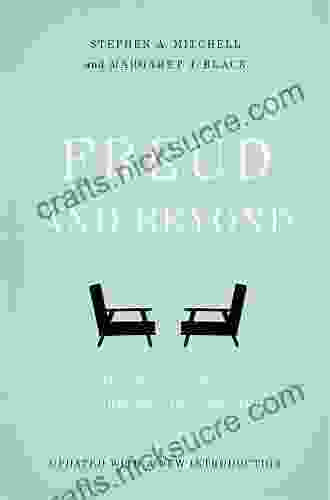
 Doug Price
Doug PriceTracing the Evolution of Modern Psychoanalytic Thought:...
Psychoanalysis, once considered a radical...
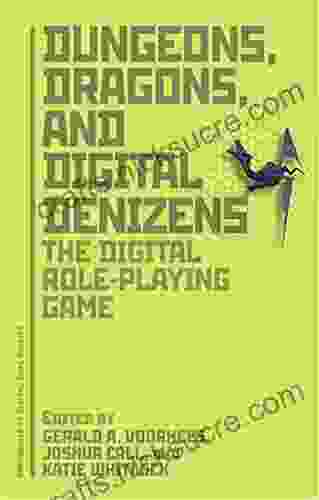
 Devin Ross
Devin RossThe Digital Role Playing Game Approaches To Digital Game...
These are just a few of the many...
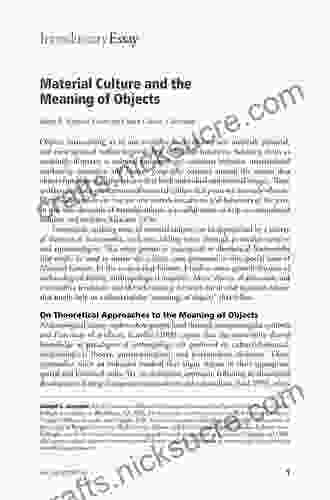
 F. Scott Fitzgerald
F. Scott FitzgeraldHistory from Things: Essays on Material Culture
History from Things:...
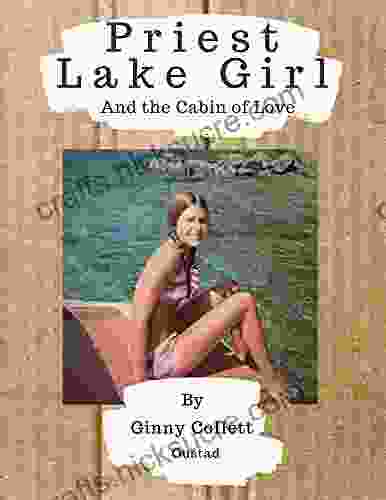
 Percy Bysshe Shelley
Percy Bysshe ShelleyThe Priest Lake Girl and the Cabin of Love: A True Story...
The Murder On...
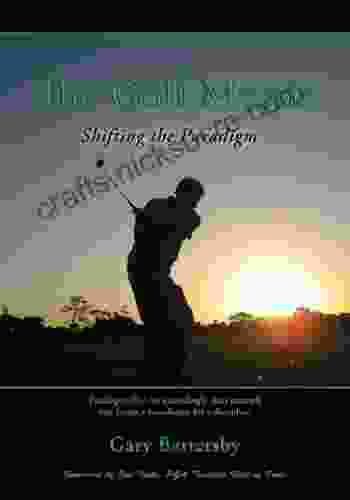
 Isaiah Powell
Isaiah PowellThe Golf Mystic: Dick Edie's Unconventional Approach to...
In the annals of golf history, the name Dick...
5 out of 5
| Language | : | English |
| File size | : | 6926 KB |
| Text-to-Speech | : | Enabled |
| Screen Reader | : | Supported |
| Enhanced typesetting | : | Enabled |
| Print length | : | 240 pages |










